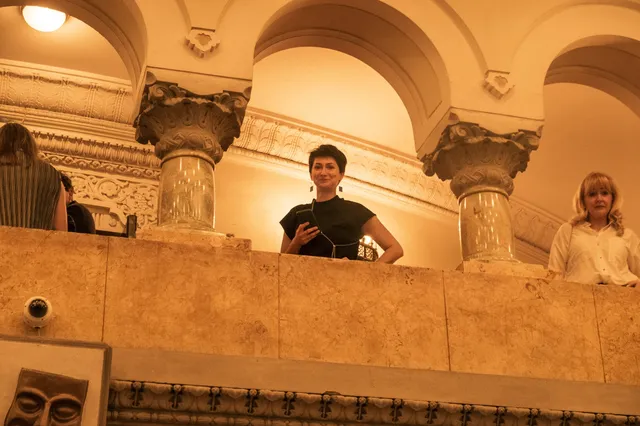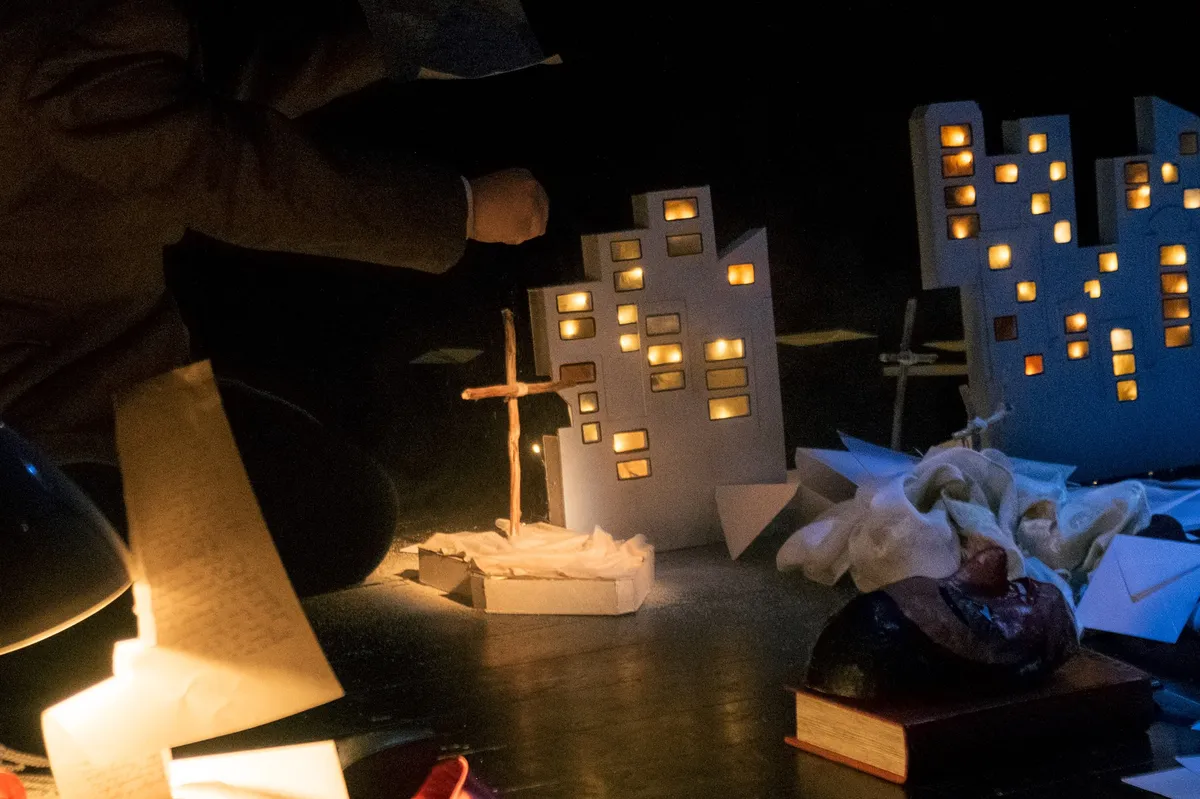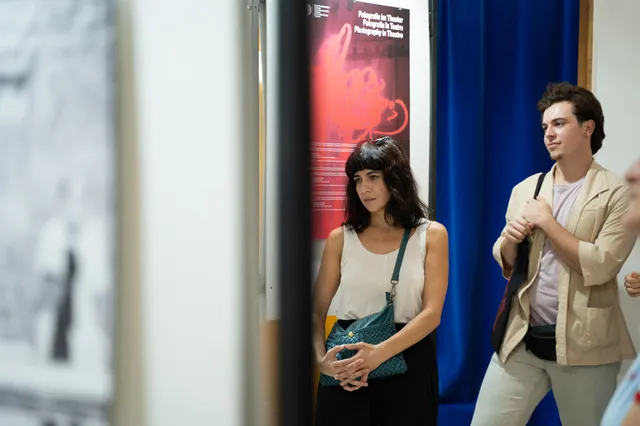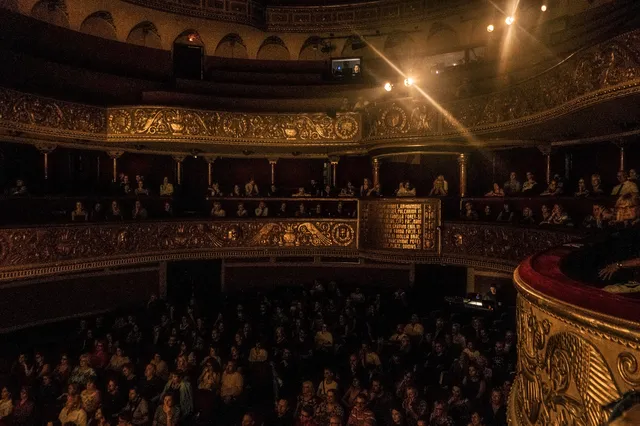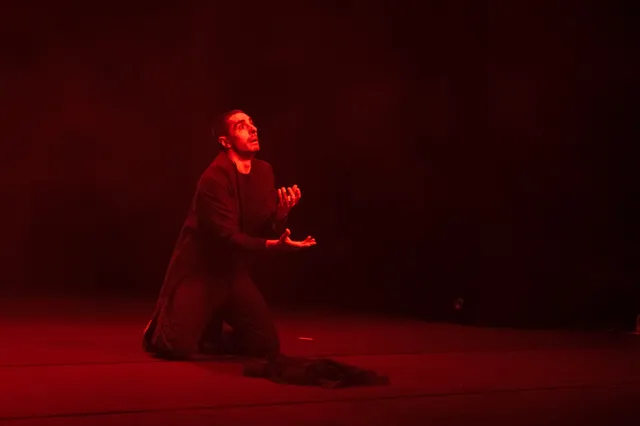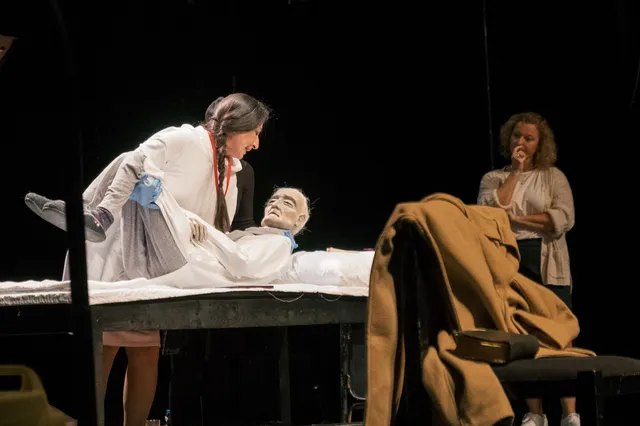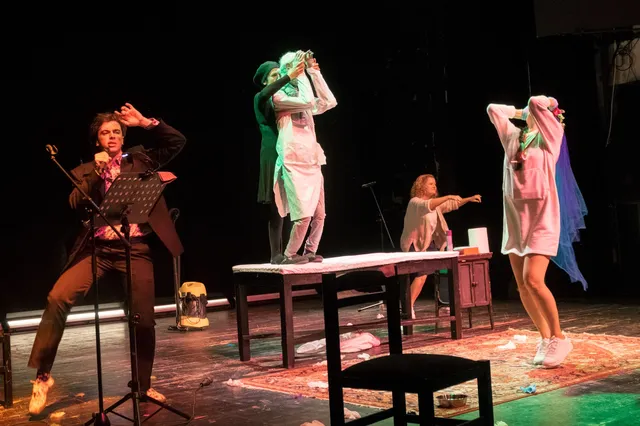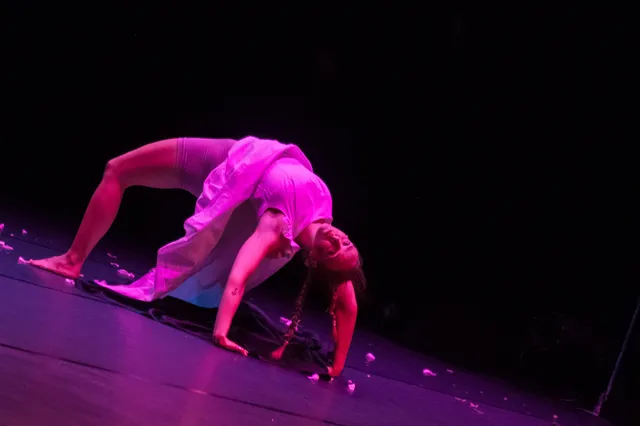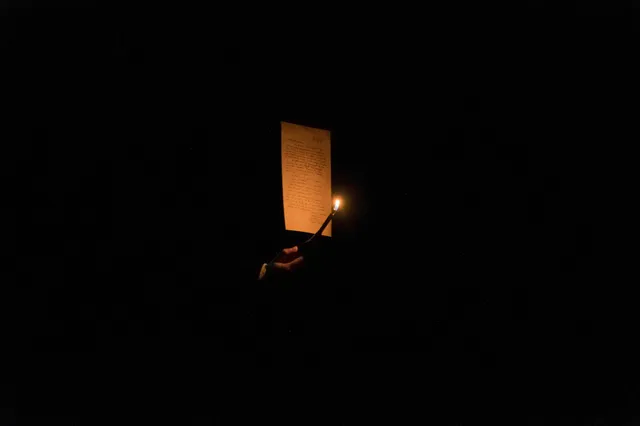Chronicle
by Elena Jebelean
“We're
all weird. That's what war is like” is a line of the Chilean show The Sparkle of a Black River, performed
by Ikarus Stage Arts, directed by Caroline Pizarro, on the music of Rodrigo
Contreras, who pointed out the soundtrack not only with Maurice Ravel's Bolero, but especially with live
interpretations of the only character, played by Gabriela Arancibia. On the
small stage of the Studio Hall, the black builds a pyramid, with the base towards the spectators. Inside the pyramid,
a centre is gradually forming. The centre is not Santiago, the city with bright
windows, of which especially those with red light are of interest. It also is
not the sometimes suspended accordion, drawing with its bellows a wide fan
reminiscent of the Spanish colonial period. Nor the pile of clothes hanging
from a chair, like a cubist dome. The centre is not the river in which all
memories seem to flow dark, slippery fish that occasionally jump to the surface
of the water or that can be fished. The setting, designed by the actress
herself who plays the only role of the play, seems to be the bottom of the
river in which all these objects and, especially, the memories float.
However,
memories are not the essence, but the memory that orders them. So, SHE is the
centre of the stage (and the centre of the show), the descendant of a long line
of soldiers, but also of a grandmother who admired the women who had chosen to
overcome their condition as submissive beings and to manifest their talent and
personality. Women who had paid with their freedom and their lives for the
audacity to face mentalities. They had dressed men's clothes as a mask, so that
they could work in fields reserved for men, and they ended up being accused,
betrayed, thrown into mental asylums or killed. Their repeated names become a
mantra of her, of the granddaughter, whom we see transforming. She tells her
story, one of the many stories of this city specializing in forgetting. Her
history is a statement, a confession – from the beginning to the end everything
is an answer to an interrogation – her horrified looks up,
to the light that is fixed on her eyes. Yes,
her grandfather was captured, she is arrested, questioned and interrogated, 12
hours a day. At 15, she had wanted to be like her grandfather. To fight,
because "Life brings out the worst in us, while war brings out the
best". She had grown up in a world where violence as a way of life was
celebrated. Now, in prison, the violence reaches its peak: she and other women
are subjected to the procedure called "Sexy Scarf".
"The
objects are hooks that catch memories from the black river", she says, the
woman raised in the praise and horror of so many military and family conflicts,
the woman whose story seems to grow precisely from the objects handled: the
torch with which the torturers hurt her eyes, but also with which she invents
an entire shadow theatre. The desk lamp under the light of which he reads the
papers selected by the grandmother and her diary. High-heeled shoes, left
aside. The blinds at the bottom of the stage are sometimes
a closet, sometimes bars. The drum with bright red sticks on which she beats
fervently, like the grandfather who was the greatest of his battalion. The bags
with the letters of the soldiers from the front, which her grandfather had
censored and which had never reached the recipients anyway. Letters on that
she, unplugging their envelopes, had learned to read. The masks she will wear,
sometimes simultaneously, to emphasize how close and odious the connection
between her grandfather and grandmother had been, forced to carry out a
dysfunctional, grotesque relationship through the idea of destructive
symbiosis, suggested by placing on the same body the two masks - male and
female - and the corresponding clothes. How unnatural to ask for such
obedience, man and woman to be one, without love, without respect. Monstrous,
that's against nature. Women who have always given up on themselves to devote
themselves to the causes of others, but who thus took over from the violence of
men. Women who, paradoxically, the weaker they were, the stronger they became.
Lives broken into strips, letters torn into strips, ties broken. Those who
dared to assume their own ideals were “crazy
women, whores, communists”.
Symbolically,
she kills her grandfather's mask. In the agreed speech, not even death is one
for all. The English soldiers die in an English way, the Italians die in mafia
style, the Mexicans – spicy, the Arabs – explosive. Only for the river,
everyone's death is the same, it blackens it. During the confession, she takes
her clothes off. At first, she wears her grandfather's
clothes, in the end, she wears an elegant black dress. But it is not about successive undressing and dressing, but about
casting off social skins, which she had worn on top of each other, highlighting
the stages she was going through. She also becomes the black river, able to
lead the evil to the sea, to assimilate it so that the surface sparkles, like
the sequins from the embroidery on her dress. Nothing is sexualized or
vulgarized throughout the show. How can one be so strong to be able to decant
the black in brightness?
The
fight continues under the motto “We will win!”, forgetting that where there are
winners, there are also losers. The spectators stand all up per request of the
actress and all say, in a chorus, without conviction, “We will win”, because
they feel the dictatorship creeping even into the theatre. Beyond the Chilean
dictatorships and the feminism in force, the show warns of the wounds that
always reopen as long as only competition animates us. The reverse of heroism
is the charm of a calm, gentle, flourishing life, which the black river, no
matter how sparkling, cannot feed for now.
---
“Theatre
Chronicle @ Eurothalia” is a programme conceived by Daniela Șilindean together
with the team of the German State Theatre Timișoara, within the Eurothalia 2023
European Theatre Festival, held between 20-30 September 2023, financed by the
National Cultural Program Timișoara - European Capital of Culture in 2023.
